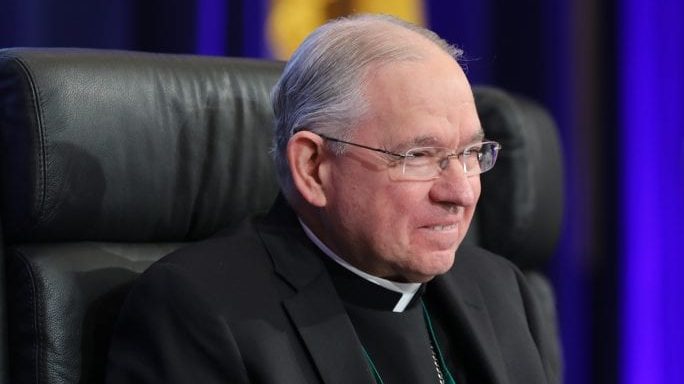Aftershocks of 2018’s reemergence of the abuse scandals continued to plague the U.S. Catholic Church throughout the past year, as leaders tried to turn a corner on one of the bleakest periods in modern American Church history while also acknowledging the pain and suffering caused by the Church’s failings.
While calls for greater responsibility, accountability, and transparency were echoed across the global Church, in the United States they were felt in a particular way with the downfall of several high-profile church leaders.
At the same time, 2019 brought new leadership reflecting the rapidly shifting face of U.S. Catholicism, and also reminders that while, at an institutional level the Church may continue to reel, in the trenches the Church’s everyday work continues - often by those who rarely see, or seek, the spotlight.
Sex abuse fallout continues
Just days after 2019 commenced, U.S. bishops spent 8 days in retreat at the urging of Pope Francis, who wrote a letter saying they shouldn’t rely on a technical solution to fighting abuse - “simply creating new committees or improving flow charts”-but challenging them to “pastoral conversion” to change a culture which, he posited, allowed abuse to fester.
The pope’s words, meant to be encouraging, would serve the bishops well as they navigated a turbulent year.
In February, Francis took the extraordinary step of removing Theodore McCarrick from the clerical state. Once one of the nation’s most powerful prelates, McCarrick’s laicization came after allegations that he abused minors and seminarians for decades, and it marked a dramatic moment for the U.S. Church’s reckoning.
Other leaders would face scrutiny throughout the year.
In June, Bishop Michael Bransfield faced allegations of sexual misconduct and financial impropriety during his thirteen years leading the nation’s poorest diocese of Wheeling-Charleston, West Virginia.
Though Bransfield has defended his actions - which include using diocesan funds to offer lucrative financial gifts to other prelates, and for expenditures such as lavish hotels and private air travel - Francis has removed him from public ministry and demanded that he make restitution. In a potentially precedent-setting move, in November, his successor, Bishop Mark Brennan, requested that Bransfield pay back nearly $800,000 to the diocese.
Throughout the year, Bishop Richard Malone of Buffalo, New York, resisted calls from priests, seminarians, and lay volunteers to resign over charges that he covered up for abusive priests. In October, Francis authorized an investigation and appointed Bishop Nicholas DiMarzio of Brooklyn to conduct it. Following its conclusion - and after months of refusing to do so -Malone offered his resignation on Dec. 4, which was quickly accepted.
All of this took place against the backdrop of new guidelines for bishop accountability, adopted by the U.S. bishops in June, following the Vatican’s new global guidelines, known as Vos Estis Lux Mundi.
The norms make it mandatory for all clerics and members of religious orders to report cases of clerical sexual abuse to church authorities, including when committed by bishops or cardinals, and requires every diocese in the world to have a system for reporting.
A third-party reporting system set up in the United States is set to take effect in early 2020.
Leadership reflecting people in the pews
Latino Catholics will soon represent the majority of Catholics in the U.S., and now, for the first-time, the leadership of the U.S. Church will more closely reflect that reality with the election of Archbishop Jose Gomez of Los Angeles as president of the United States Conference of Catholic Bishops (USCCB).
Gomez, elected in a landslide vote in November, will serve a three-year term. A Mexican-born immigrant, Gomez will lead the U.S. bishops in their defense of migrants at a time when the Trump administration has threatened the status of hundreds of thousands of young undocumented migrants known as Dreamers and has vowed a continued crackdown at the southern border.
U.S. Catholics in the nation’s capital were also given a new leader who reflects diversity in the pews when, in April, Francis appointed Archbishop Wilton Gregory to succeed Cardinal Donald Wuerl as the new Archbishop of Washington.
Gregory is the first African American to lead an archdiocese seen as one of the centers of African American culture in the United States, and the announcement was timed to coincide with the 51st anniversary of the death of Dr. Martin Luther King, Jr.
Should Gregory eventually be made a cardinal - as traditionally leaders of the nation’s capital have been - he would become the first African American to be given a red hat.
Overlooked work and workers
Despite what some may view as a cascade of depressing news, Catholics were also on the frontlines on a number of issues that Francis continues to put front and center in his papacy, most notably migration and fighting climate change.
On the U.S. southern border, Sister Norma Pimentel has expanded her Humanitarian Respite Center, which provides shelter and aid to migrants who have recently crossed. The “Remain in Mexico” policy, which has left tens of thousands of people to stay on the other side of the border as they wait to apply for asylum, has made that work more challenging, yet Pimentel is one of the few individuals working on the migration issue who’s managed to receive praise from politicians on both sides of the aisle.
If Pimentel is in the trenches, Molly Burhans is using technology to help the Church navigate the complexities of a globalized world.
In September, Burhans was awarded the United Nations’ “Young Champions of the Earth” Prize for North America, representing the first faith-based organization to receive such an honor for her work in founding Goodlands which maps the Church’s global real estate holdings to better understand climate change, migration, and a range of interconnected ecological concerns.
At age 30, Burhans is helping the Church remember timeless truths - such as the gospel’s command to care for one’s neighbors - through new technology.
“We aren’t in it for awards,” she said. “We’re in it because we love our neighbors.”

